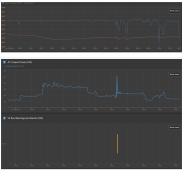photons2e-s
New Member
- Joined
- Oct 26, 2022
- Messages
- 34
Setup: off-grid Victron 250/60 MPPT, Multiplus 3000W inverter, Trophy 48V/100Ah (installed 11/2022)
Here is my problem --
To keep the inverter from having a “High DC Ripple” alarm and then shutdown, the battery cannot get to a self-reported 100% SOC.
When it does get to 100%, it disconnects itself, mostly, from loads and will not reconnect until the MPPT stops providing current to the inverter for loads. When the MPPT does not provide power (sundown) and when the current demand is high, the battery reconnects reliably, then the cycle repeats the next day until/if 100% is reached.
The battery does provide low current, sometimes, to the inverter before sundown, but not continuously, or at a high amount of current.
During this disconnected state, the voltage at the battery terminals (also have the MPPT and inverter at these studs) is higher than the V reported on the battery display by 1-4V depending on the load. In this disconnected state, if I cycle a space heater on/off, I get a high DC ripple alarm which can shutdown the inverter (wife gets mad).
On a day when the battery does not get to 100% or earlier in the day while the MPPT is charging, I can cycle the heater without the alarm and the voltages all match.
This problem happens with and without the CAN bus data cable plugged in, no matter what charging parameters are set in the MPPT.
The attached screenshot is from the Victron VRM which shows the voltage disparity (red curve is the reported Trophy V, blue is the actual V), power (middle graph where a load cycled, and the High DC alarm created.
Has anyone else experienced this with the Trophy?
Does this kind of situation occur with other batteries/BMSs?
Talking to the SOK and EG4 dealers, they have no issues like this with their products.
I've been in contact with Dan at Trophy about this.
Any guidance here would be appreciated.
Here is my problem --
To keep the inverter from having a “High DC Ripple” alarm and then shutdown, the battery cannot get to a self-reported 100% SOC.
When it does get to 100%, it disconnects itself, mostly, from loads and will not reconnect until the MPPT stops providing current to the inverter for loads. When the MPPT does not provide power (sundown) and when the current demand is high, the battery reconnects reliably, then the cycle repeats the next day until/if 100% is reached.
The battery does provide low current, sometimes, to the inverter before sundown, but not continuously, or at a high amount of current.
During this disconnected state, the voltage at the battery terminals (also have the MPPT and inverter at these studs) is higher than the V reported on the battery display by 1-4V depending on the load. In this disconnected state, if I cycle a space heater on/off, I get a high DC ripple alarm which can shutdown the inverter (wife gets mad).
On a day when the battery does not get to 100% or earlier in the day while the MPPT is charging, I can cycle the heater without the alarm and the voltages all match.
This problem happens with and without the CAN bus data cable plugged in, no matter what charging parameters are set in the MPPT.
The attached screenshot is from the Victron VRM which shows the voltage disparity (red curve is the reported Trophy V, blue is the actual V), power (middle graph where a load cycled, and the High DC alarm created.
Has anyone else experienced this with the Trophy?
Does this kind of situation occur with other batteries/BMSs?
Talking to the SOK and EG4 dealers, they have no issues like this with their products.
I've been in contact with Dan at Trophy about this.
Any guidance here would be appreciated.



